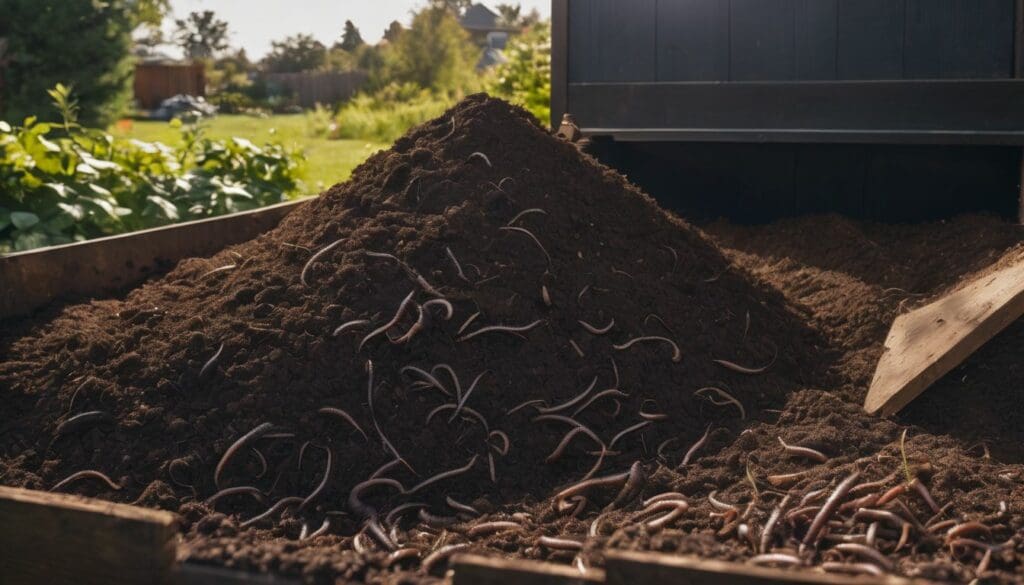Gardens thirst for nutrients and vitality, yet chemical solutions can harm more than help. Composting is a natural process that turns organic waste into rich soil food, without any synthetic nasties.
In this article, we’ll unveil how setting up your own composting system at home can lock in soil moisture, save money, and nurture your garden while being kind to the planet. Discover the joy of turning scraps into treasure!
Key Takeaways
- Home composting transforms organic waste into ‘black gold‘, enriching the soil with essential nutrients and improving plant health whilst avoiding harmful chemicals.
- Various composting methods exist, such as traditional outdoor, trench, vermicomposting (with worms), and Bokashi (fermentation), catering to different household needs and garden sizes.
- Composting at home saves money on fertilisers and synthetic soil conditioners, reduces methane emissions from landfills, thereby lowering your carbon footprint and combating climate change.
- Maintaining a balanced mix of ‘browns’ for carbon and ‘greens’ for nitrogen is essential in home composting; proper temperature control, aeration strategies, moisture levels are key factors for successful decomposition.
- Utilising community-based composting initiatives offers an alternative route for those unable to manage a personal compost system; it promotes wider environmental benefits by fostering collective eco-friendly practices.
What is Composting?
Composting is a natural process that turns organic waste into a nutrient-rich soil enhancer. It involves layering kitchen scraps like fruit peels, vegetable trimmings, and garden clippings with more fibrous materials such as leaves and cardboard.
Microorganisms break down these elements over time, producing compost that improves soil health and aids plant growth. This eco-friendly practice not only recycles organic material but also reduces greenhouse gas emissions by keeping it out of landfills where it would release methane.
The end result of composting is a dark, crumbly substance often called ‘black gold’ by gardeners for its ability to enrich soil and support sustainable agriculture. By adding this compost to your garden, you create an environment rich in nutrients that plants need while simultaneously improving moisture retention and preventing erosion.
As we explore the varied benefits home composting systems offer, let’s delve into how they can transform your gardening practices and contribute to environmental conservation.
The Benefits of Home Composting Systems
Home composting systems offer a range of benefits such as retaining soil moisture, keeping chemicals out of your garden, saving energy and money, and lowering your carbon footprint.
There are various types of home composting methods to suit different lifestyles and living situations.
Retains soil moisture
Retaining soil moisture is vital for healthy plant growth and the overall health of your garden. Compost helps to keep the soil moist by acting as a sponge, absorbing and holding water that would otherwise evaporate.
This means less watering and healthier plants, while also preventing soil erosion and creating a more sustainable environment for your garden. Maintaining proper moisture levels in the soil promotes nutrient recycling, aiding in plant growth promotion.
Moving on to “Keeps chemicals out of your garden” – let’s explore how home composting systems help you achieve this goal.
Keeps chemicals out of your garden
Home composting systems keep chemicals out of your garden, promoting organic and chemical-free soil enrichment. This helps create nutrient-rich soil that supports vibrant plant growth without the need for synthetic fertilisers.
By using compost made from organic waste, you reduce the risk of harmful chemicals leaching into the ground and polluting the environment, contributing to a healthier ecosystem.
Organic waste recycling through home composting effectively prevents chemical runoff into waterways and reduces reliance on potentially harmful pesticides in your gardening practices.
Saves energy
By composting at home, you reduce the need for transportation and energy use associated with waste collection and disposal. This eco-friendly practice not only minimises the carbon footprint but also lowers overall energy consumption.
The decaying process of organic waste in landfills produces methane gas, a potent greenhouse gas adding to global warming effects. However, choosing to compost at home prevents this harmful emission and contributes to reducing energy usage across the waste management process.
Converting food scraps and yard waste into nutrient-rich soil through composting uses less energy compared to traditional methods of production and disposal of fertilisers. With homemade compost supplying essential nutrients for your garden, it significantly reduces the demand for synthetic fertilisers that are often produced using high levels of energy.
Saves money
Home composting can save you money by reducing the need for store-bought soil conditioners and fertilisers. This organic waste management practice means less spending on garden supplies and helps to lower your overall gardening costs.
Nutrient-rich soil created from composting also reduces the need for water, making home gardening more cost-effective in the long run.
Lowers carbon footprint
Composting at home reduces the amount of organic waste sent to landfills, lowering methane emissions that contribute to global warming. By diverting organic matter from traditional waste disposal methods, you actively reduce greenhouse gases and help combat climate change.
Plus, using compost in your garden enriches soil quality, promoting healthier plant growth and reducing the need for chemical fertilisers. These simple actions have a direct impact on lowering your carbon footprint and fostering a more sustainable environment.
Moving on from mitigating environmental impact through home composting systems, let’s delve into the different types of composting suitable for various lifestyles and spaces – illustrating how easy it is to integrate eco-friendly practices into daily life.
Types of Home Composting
There are several types of home composting systems, including traditional outdoor composting, trench composting, vermicomposting using worms, and bokashi composting through fermentation.
Each method has its own benefits and can be tailored to suit the individual needs of your garden or household waste management.
Traditional outdoor composting
Traditional outdoor composting is a simple and effective method for recycling organic waste into nutrient-rich soil. It involves layering green and brown materials in a designated area, allowing them to naturally decompose over time.
By utilising this eco-friendly practice, you can reduce landfill waste, prevent erosion, and contribute to greenhouse gas reduction.
This approach is beneficial for environmentally conscious individuals seeking to support conservation efforts and promote sustainable practices. By actively participating in traditional outdoor composting, you can play a vital role in creating nutrient-rich soil, reducing your carbon footprint, and promoting organic waste recycling within your community.
Trench composting
Trench composting involves digging a trench in your garden and filling it with organic waste. This method enriches the soil directly where you plan to plant, providing essential nutrients for plants to thrive.
By burying food scraps and yard waste underground, you can create nutrient-rich soil without taking up space on the surface. Trench composting also helps prevent erosion by improving soil structure and retaining moisture, making it an eco-friendly way to boost your garden’s health while reducing waste.
When considering different home composting methods, trench composting is a practical option that efficiently utilises organic materials and contributes to environmental sustainability.
Vermicomposting (using worms)
Vermicomposting, using worms, is an efficient way to turn food scraps and organic waste into nutrient-rich soil for your garden. Worms consume the organic matter and then excrete it as castings, which are packed with plant nutrients.
This process not only reduces waste but also creates an eco-friendly cycle of using natural resources to improve soil health.
The beauty of vermicomposting lies in its ability to be done indoors, making it accessible year-round. By choosing this composting method, you can actively contribute to waste reduction while creating a sustainable source of nutrient-rich soil for your garden.
Vermicomposting is a simple yet effective way to practice environmentally conscious habits at home.
Bokashi composting (fermentation)
Transitioning from vermicomposting, Bokashi composting, or fermentation composting is another effective method for environmentally conscious individuals. This process relies on fermenting organic waste using beneficial microbes to break down materials in an airtight container.
It’s a quick process that doesn’t require much space and can even handle meat and dairy products, producing a nutrient-rich soil amendment.
Bokashi composting accelerates the breakdown of food scraps, improves soil health, and provides an eco-friendly way to dispose of organic waste while reducing methane emissions. The resulting fermented material can be buried directly into the soil or added to your traditional compost bin, enriching the nutrient levels in your garden while diverting waste from landfills.
How to Compost at Home
To compost at home, you’ll need a mix of “browns” (like dead leaves and twigs) and “greens” (such as fruit scraps and grass clippings). These materials will need to be kept at the right temperature with proper aeration and moisture levels.
Compost ingredients (browns and greens)
Composting requires a good mix of browns and greens.
- Browns provide carbon
- Greens give nitrogen
- Brown materials include dead leaves and sawdust
- Green materials entail fruit and vegetable scraps
- Straw is also an ideal brown material
Proper temperature and aeration
Maintaining the proper temperature and aeration in your compost pile is crucial for the breakdown of organic matter. Aerate your compost regularly by turning it with a pitchfork or shovel to introduce oxygen, aiding the decomposition process.
Keep the temperature between 120-150 degrees Fahrenheit to ensure that beneficial microorganisms can thrive and break down materials effectively, creating nutrient-rich soil for your garden.
Ensuring adequate aeration and maintaining optimal temperatures are essential components of successful home composting systems, promoting eco-friendly practices while enriching soil health.
Nutrient-rich soil encourages plant growth while reducing erosion, further supporting environmental conservation efforts.
Maintaining moisture levels
To maintain moisture levels in your compost, regularly check and adjust the dampness of the materials. Use a hose to lightly spray the compost if it’s too dry, or add more dry or brown materials if it’s too wet.
Turning the compost regularly will help distribute moisture evenly throughout, aiding in the decomposition process. Properly maintaining moisture levels fosters an environment where beneficial microbes thrive and break down organic matter efficiently.
By maintaining optimal moisture levels, you ensure that your composting system functions effectively while also preventing any foul odors or harmful bacteria from developing. This proactive approach supports eco-friendly practices by creating nutrient-rich soil for use in gardens and reducing waste sent to landfills.
Choosing a location for your compost bin
Proper placement of your compost bin is essential for successful decomposition. Find a level area in partial sunlight to maximise the breakdown process. Remember, proximity to your kitchen will encourage regular use and minimises trips outside.
Locate your compost bin away from direct sunlight, as excessive heat can harm beneficial organisms inside. It also reduces water loss and maintains moisture levels within the materials.
Keep it close enough to conveniently deposit waste but far enough from the house to avoid attracting pests indoors.
Using Compost in Your Garden
Improves soil health and reduces erosion, leading to a healthier, more sustainable garden. Learn more about the benefits of home composting systems by reading on!
Improves soil health and reduces erosion
Composting improves the health of your soil and helps prevent erosion. Nutrient-rich compost enhances the structure of the soil, creating a healthy environment for plants to grow. By reducing erosion, composting also helps to maintain the integrity of the topsoil, preventing valuable nutrients from being washed away during heavy rains or strong winds.
Furthermore, by incorporating regular compost into your garden beds and landscaping, you are promoting eco-friendly practices that support environmental conservation. Consistently adding compost to your soil creates a sustainable cycle that benefits both your immediate surroundings and the broader ecosystem.
Moving on from improving soil health and reducing erosion, let’s explore how home composting systems can reduce the need for water and fertilisers in gardens.
Reduces the need for water and fertilisers
Home composting reduces the need for water and fertilisers by enhancing soil’s water retention ability and nutrient content. This decreases reliance on irrigation and chemical additives, supporting environmentally friendly gardening practices while preserving precious resources.
The nutrient-rich compost improves soil quality, reducing the necessity for synthetic fertilisers and minimising water usage.
Composting also fosters eco-friendly practices by aiding in erosion prevention through improved soil structure. By using compost to enrich garden beds, less watering is required as a result of enhanced moisture retention capabilities.
What can and cannot be composted
Composting is an effective way to reduce waste and create nutrient-rich soil. When composting at home, it’s important to know what materials can and cannot be composted. Here are the key items that can be composted:
- Fruit and vegetable scraps
- Coffee grounds and filters
- Eggshells
- Grass clippings
- Leaves and plant trimmings
- Straw and hay
- Shredded newspaper and cardboard
- Meat, fish, and dairy products
- Oily foods
- Weeds with seeds or roots
- Diseased plants
- Pet waste
Community composting and outsourcing options
Local community composting and outsourcing options provide environmentally conscious individuals with alternatives to home composting. Collaborating with local community gardens or municipal composting programs allows for the recycling of organic waste on a larger scale.
This collective approach can benefit the wider community by reducing landfill waste and creating nutrient-rich soil amendments for public green spaces. Additionally, using an outsourcing service to collect organic waste from your home can help support eco-friendly practices without the need for managing a personal compost system.
By utilising these community-based options, you are actively contributing to conservation efforts and promoting sustainable environmental practices within your local area. Moreover, supporting communal composting initiatives aligns with eco-conscious values and fosters a sense of shared responsibility towards nurturing our planet’s health.
Conclusion
In conclusion, home composting systems provide nutrient-rich soil for your garden. These eco-friendly practices help retain moisture and keep chemicals out of your gardening space.
By reducing waste and lowering your carbon footprint, you can actively contribute to environmental conservation efforts. Embrace the benefits of home composting to support a sustainable future for generations to come.
FAQs
1. What are the benefits of having a home composting system?
Home composting systems provide nutrient-rich soil for gardens and support eco-friendly practices by recycling kitchen and yard waste.
2. How does composting at home help the environment?
Composting at home cuts down on landfill waste, reduces greenhouse gas emissions, and recycles nutrients back into the earth.
3. Can I use compost from my home system to grow food?
Yes, you can use the nutrient-rich soil from your compost to grow healthy fruits and vegetables in your garden.
4. Is it hard to maintain a home composting system?
Maintaining a home composting system is quite easy once you understand what materials can be composed and remember to turn your pile regularly.





